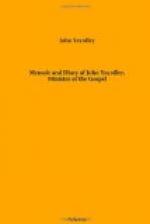In company with Elizabeth Dudley they hold several public meetings at various places on the island. They have left no record of this service, but we have a notice of the meeting at Porchfield, in a letter from E.D.
The meeting was very satisfactory, sweet and refreshing to our spirits. The road was rough and hilly. We were behind time, and our friends being punctual, the house looked full when we got there, though more followed, until not only within but outside the walls there was a crowd of orderly, attentive people. Many of them were happily acquainted with the power of religion in their hearts, and prepared for spiritual worship. The assembly was composed of various denominations from a straggling village and more remote habitations. The chapel was built many years ago, by a pious man, now above eighty years old, who was with us, and who enjoys to have the place used by any who from love to Christ and the souls of men are attracted to visit them. The simplicity and openness to be observed and felt that evening was a comforting indication of freedom from party spirit, and those vain disputations which in so many instances keep Christians at a distance, and mar their individual peace as well as usefulness.
Before they left Newport, they provided, with the help of several friends, suitable accommodation for the little meeting of Friends in that town. On taking leave of the island, which they did in the Eighth Month, John Yeardley remarks:—
We have had much comfort and satisfaction in our sojourn in this place: a strong evidence is felt in our hearts that it has been ordered by the Lord. We have cause to acknowledge that our labors have been owned by the Divine Presence in our various exercise for the promotion of the Saviour’s kingdom.
In the spring of 1841 they repeated their visit to the Isle of Wight, spent great part of the summer in religious service in Essex, and visited afterwards Bristol, Bath, and other parts of Somersetshire.
At Bath they remained for some weeks. Soon after their arrival in the city, they were introduced into sympathetic sorrow on account of the death of John Rutter, whose guests they were, and who was suddenly removed, by an accident, from time to eternity. This event is described in a letter from John Yeardley to his sister R. S.
Bath, 9 mo. 24, 1841.
The affectionate family of the Rutters gave us a hearty reception, and we remained under their hospitable roof until Second-day, when they were plunged into deep distress by the awfully sudden removal of their beloved father. He went out before breakfast, and called at his son’s wharf. A cart of coals being about to be weighed, he was leading the horse on to the machine; the animal, being a little unruly, suddenly rushed forward and pushed down J. R, and the wheel passed over his body. He was immediately conveyed to his own shop, when the spark of life became extinct, and he ceased to breathe,




